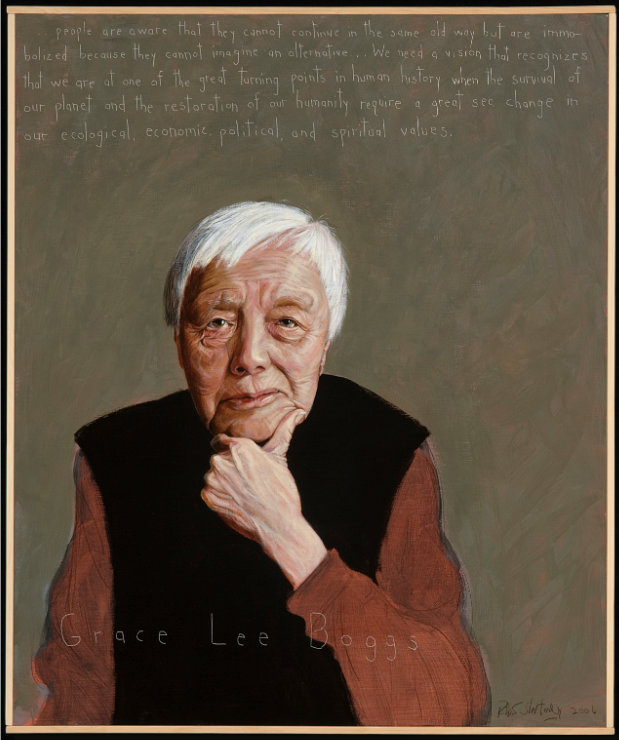- Grace Lee Boggs
 |
| Grace Lee Boggs Painting by Robert Shetterly |
As she edges her way toward 100 years old, Grace Lee Boggs' wise, charismatic face is etched with the wins and losses of a lifetime of searching for social justice. Her ever curious eyes hint at the powerful original mind behind them. And Boggs is not about to stop looking. Grace Lee Boggs is revered as a visionary living legend. She has not only been an activist in virtually every progressive American social and environmental movement of the last 75 years, but always questioning, always learning, she is also a profound philosopher of social change.
Grace Lee Boggs puts her life where her beliefs are. She can be found many days working in a community she helped create out of abandoned neighborhoods in Detroit. When the auto industry departed, many viewed deserted, decaying Detroit as an urban wasteland. Boggs saw urban farmland, housing, and a self-sustaining community run on its own energy. Like the crops planted and co-workers who joined in the community, Boggs believes all revolution comes from the roots up: people changing their fundamental relationships to each other, their work, their food, and their environment. She did not always see it this way.
Born an Chinese-American woman in the 1940's, Boggs left school with a doctorate in Philosophy and found she was worth so little in the world she was not even allowed to rent a room. She saw activism as simply doing what she needed to do. Boggs identified closely with the struggle of the Civil Rights movement. Along the way, in Detroit, she met and married her kindred spirit James Lee Boggs. Together they protested, philosophized and published until his death in 1993. Her commitment to Detroit would be lifelong.
It would be late 1960's Civil Rights movement that caused Boggs to radically change some of her bedrock beliefs. In the late '60's, Boggs supported the militant Black Power movement over that of the peaceful vision of Dr. Martin Luther King. Boggs thought King's approach was too soft. After King's assassination, Detroit and dozens of other American cities erupted in deadly riots, largely destroying only Black neighborhoods. After the rioting, Boggs says, she realized it was time for a huge revision in thought. Rebellions, (that's what she called the riots), are negative, effective only for denouncing and exposing an enemy. Revolution requires creativity and hope to overcome decay and despair. In other words, revolution requires positive vision for a different future, not just rage and exposure of an unjust present.
Boggs believes America is due for a revolution now, in the first decades of the new millenium. Not a shallow revolution--just a change in rulers at the top-- but a Boggs revolution; a deep change in the culture from the bottom up. She thinks America is at a unique point in history where America's very ideas of itself have completely run their course. Boggs sees America as a militaristic, materialistic nation that (with the help of cheap credit and cheap oil) became a people lost in conspicuous consumption. In simpler terms, America is a country of soulless shoppers, willing to go to war for the limited natural resources to maintain a pampered but empty way of life.
Grace Lee Boggs frustrates many political thinkers because she doesn't believe big change will come through any political system. She says politicians change rules, not cultures. She thinks the future will come from grass roots movements. "People are aware they cannot continue in the same old way but they cannot imagine the alternative...We are at one of those points in history where we need revolution and revolution means reinvention of culture." And pushing 100 or not, from the way she speaks about that coming American Revolution, it sounds like Grace Lee Boggs fully expects to be there.
Page created on 11/30/2011 4:50:27 PM
Last edited 6/4/2020 12:46:59 AM
